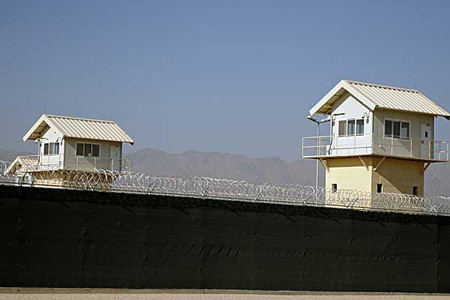The Los Angeles Times, October 19, 2010
Hidden justice
Are the U.S. Detainee Review Boards for suspected Afghan insurgents fair? Ask Mullah Tractor.
By Rachel Reid
The first question was the obvious one. Why are you known as Mullah Tractor? "I read one or two Islamic books, so people call me Mullah. And then I bought a tractor. So I am Mullah Tractor."

This file photo taken on November 15, 2009, shows watchtowers along the perimeter of the Bagram prison, north of Kabul, in November 2009. (Photo: AFP)
Mullah Tractor wore an orange jumpsuit, signaling maximum security. He looked to be about 60 years old, with thin downturned lips, a contoured nose that might once have been broken and a short black-and-white beard.
His real name is Gul Shah Wazir, and he is in U.S. detention in Afghanistan, accused of being a member of the Taliban. But at the U.S. military hearing that I observed in late September, whether he is connected to the insurgency was hard to determine.
This was a Detainee Review Board, a type of hearing taking place in a new detention facility on the edge of Bagram airfield, north of Kabul. Though the site is physically much improved from the old Bagram prison, this is still a long way from a just process. For the hearings to be minimally fair, the detainees should be able to contest the evidence against them and have access to a lawyer. Instead, a detainee faces a three-member U.S. military panel, which tries to determine whether he is an insurgent and whether he would continue to pose a threat if released.
The evidence against Wazir was pretty hazy, judging by the questions from the panel. Did he know the notorious insurgent commander Sirajuddin Haqqani? Wazir said no. Perhaps the U.S. had intelligence leading it to believe that he did. If so, no one told Wazir.
He was asked numerous times about a madrasa, or religious school, he runs, but the questioners gave no indication why this might link him to the insurgency. He answered repeated questions about why his family had multiple properties and why he'd spent time in Dubai. No one suggested that the apparent wealth of the family might indicate terrorist activity, as opposed to running a lucrative farming business, with tractors. A lawyer representing Wazir might easily have poked holes in such lines of questioning.
But detainees have no lawyers. Instead, Wazir was given a "personal representative." Until last year, detainees had no assistance whatsoever, so this is an improvement. But only just. Personal representatives are supposed to speak on the detainee's behalf at the hearing. But why would a detainee trust a military officer when the person wears the same uniform as those who detained him — also the same uniform worn by the panel sitting in judgment of him.
Such doubts may be justified. Despite a recent rule requiring greater confidentiality between the detainee and his personal representative, what the detainee tells his representative could still be used against him in many circumstances. Trust issues aside, in the four reviews I observed, these representatives did not offer any persuasive advocacy on behalf of the detainees.
After less than an hour, Wazir was led out of the room so that the board could review any classified information. It's quite possible that there is some highly incriminating intelligence on Wazir. But because it's classified, Wazir probably will never know what keeps him behind bars, nor will he ever be able to challenge the evidence. He's waiting for the panel's decision. If he remains in U.S. detention, this process will be repeated once every six months, until he is released or transferred to Afghan custody.
U.S. military and intelligence services are clearly reluctant to reveal their sources and methods. But the culture of secrecy in Afghanistan borders on the absurd. As one U.S. official acknowledged to me, when the contents of a man's pockets can be classified secret, even from him, then something is wrong.
The Pentagon recently has tried hard to improve its detention policy in Afghanistan. It should take two more achievable steps. The first is to give detainees access to legal counsel, an internationally recognized right. The second is to decrease classification levels.
This process has already begun, driven by the desire of the United States to stop being a jailer in Afghanistan and to hand over detention to the Afghan government. To do this, it recognizes that it will have to start providing evidence that will stand up in Afghan courts and stop relying on intelligence kept behind closed doors.
These changes matter both on principle and on more pragmatic grounds. In the last six months, since the military surge, the number of Afghans detained by the U.S. has almost doubled, to more than 1,100. The majority will be transferred to Afghan custody or released with increasing speed.
That means hundreds of Afghans like Mullah Tractor will return to their communities. To avoid generating a large group of men harboring ill will, the U.S. should provide due process. That will require more lawyers, and less secrecy.
Rachel Reid is the Afghanistan analyst for Human Rights Watch.
Characters Count: 5702
